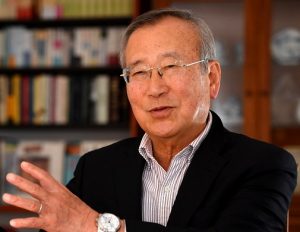Hiroshima Voices: “No Nukes, No War” Tadatoshi Akiba, 80, former Hiroshima mayor, Hatsukaichi City
May 16, 2023
Courage needed to press for principle of ‘no use of nuclear weapons’
by Kohei Okata, Staff Writer
After working as an associate professor in the United States at Tufts University and as a member of Japan’s House of Representatives (the lower house of that country’s parliament), Mr. Akiba became mayor of Hiroshima in 1999. During his three terms of office as Hiroshima’s mayor over the course of 12 years, while concurrently holding the post as president of the organization known as the World Conference of Mayors for Peace through Inter-city Solidarity (now the Mayors for Peace), he fought for the elimination of nuclear weapons. In 2010, he received the Ramon Magsaysay Award, which has been described as the “Nobel Prize of Asia.”
Click here to view the video
Hiroshima bears the burden of preventing Japan and the world from waging nuclear war. Russian President Vladimir Putin’s threats to use nuclear weapons amid the Ukraine situation are intolerable. Japan’s Prime Minister Fumio Kishida, as a representative of Hiroshima, must take dramatic action in this regard, such as paying a visit to Moscow to voice the stance of A-bomb survivors that “nuclear weapons must not be used.”
Major progress at the upcoming summit meeting of the G7 (Group of Seven industrialized nations) is absolutely essential. “The use or threat of use of nuclear weapons is inadmissible” was the official language adopted in the Bali Leaders’ Declaration issued at the G20 Leaders’ Summit (the Group of 20), held in November 2022, at which G7 leaders were also in attendance. At the G7 Hiroshima Summit, a worldwide policy of “no first use of nuclear weapons” should be adopted.
The nuclear deterrence theory, supported by the threat of nuclear weapons use, would cease to exist without first use or any other use of the weapons. I suggest that Prime Minister Kishida strike a no-first-use agreement with his counterparts, conditioned on Russia’s agreement, and then fly to Moscow to persuade President Putin to agree with the policy. If a no-first-use policy were to be declared and mutual trust achieved over time, a solution to the war in Ukraine might come into view. Every plausible solution should be attempted to avert a third world war.
On the other hand, the nuclear deterrence theory must not appear to receive acceptance in Hiroshima. If Japan’s leader is seen as affirming the theory in his home district of Hiroshima, people would naturally interpret that as Hiroshima lending credence to the theory.
The G8 Summit of Lower House Speakers (Speakers’ Summit), a meeting in which Russian representatives also took part, was held in Hiroshima in 2008. At that time, I guided the participants through the Hiroshima Peace Memorial Museum, located in the city’s Naka Ward. After the participants listened to a personal account of the atomic bombing provided by Akihiro Takahashi, former director of the museum who died in 2014 at the age of 80, then-Speaker of the U.S. House of Representatives Nancy Pelosi grasped his hand and commended him with the words, “That was beautiful.”
I want Mr. Kishida to take the initiative and guide the G7 leaders at the Hiroshima Summit on a tour of the museum and, afterward, remind them with conviction as a representative of Hiroshima, “With that knowledge, the use of nuclear weapons should be inconceivable.” No one would be able to refute that sentiment. The leaders would be forever bound by their response to the prime minister, or bear the shame of not taking a clear enough stand. That is how we can make the most of Hiroshima’s role as host of the summit meeting.








